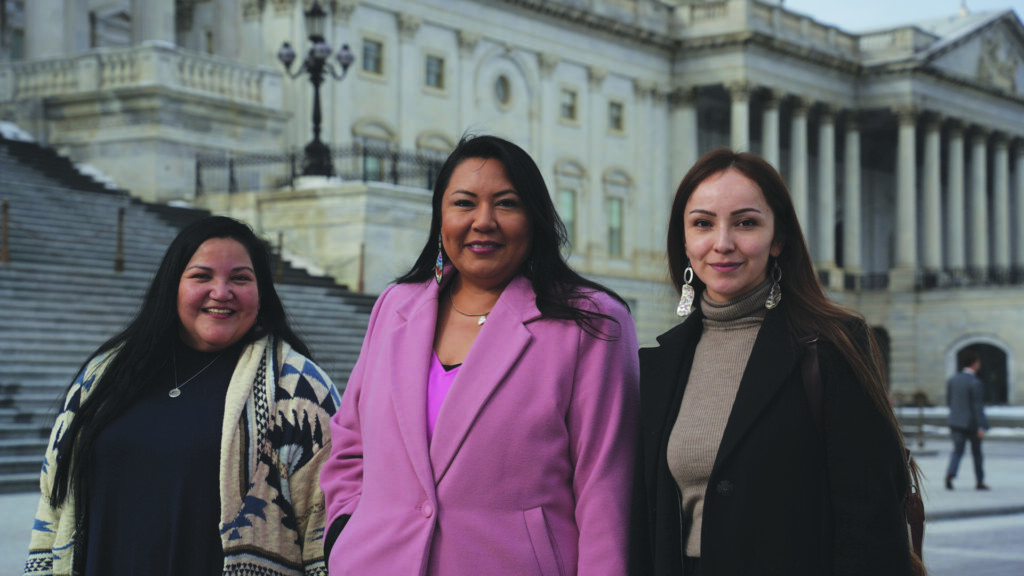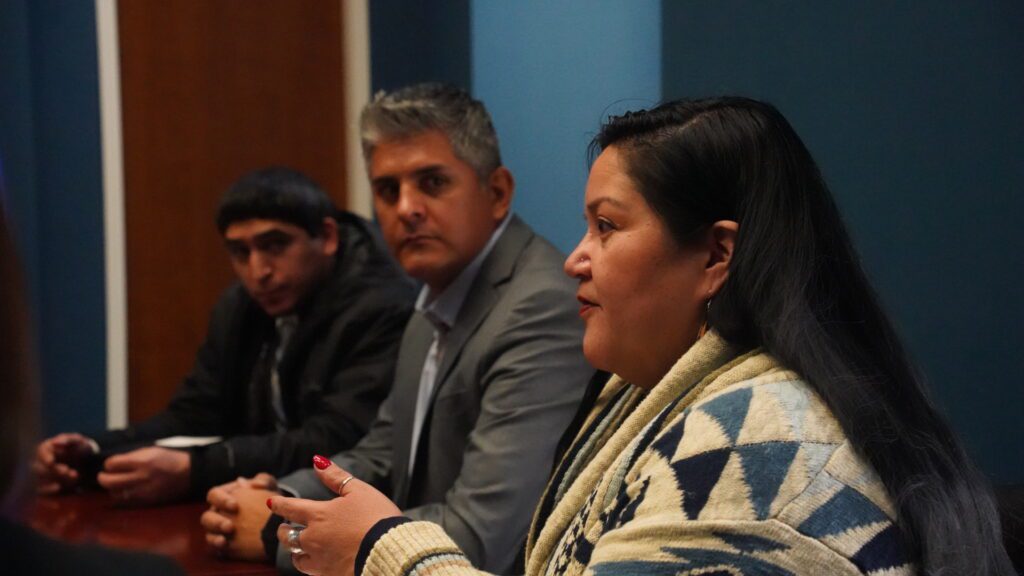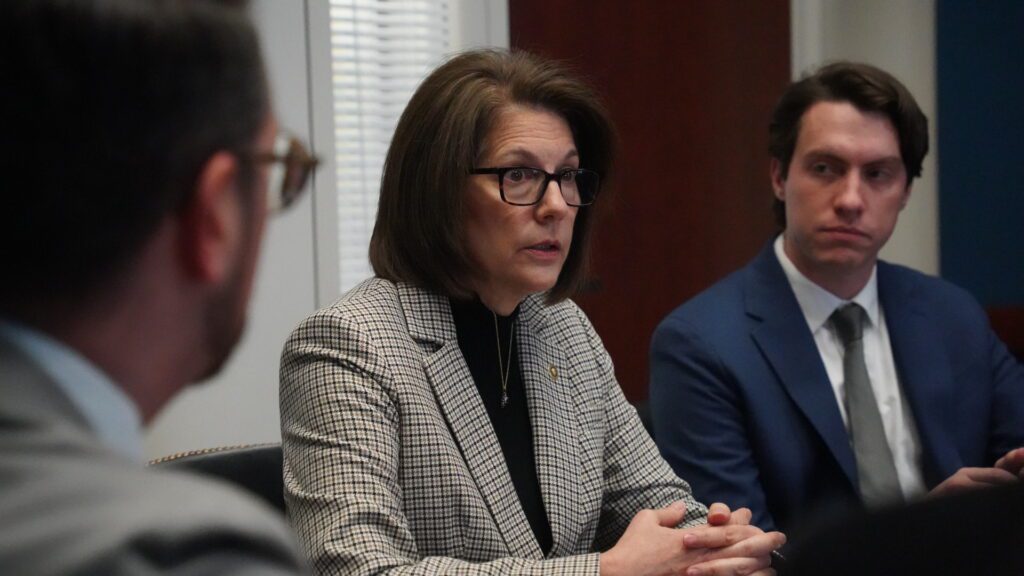Tribal Stakeholders Advocate for Tax Reform in Indian Country on Capitol Hill

: Sharon Scott (left), Director for the Oklahoma Indian Tax Association, Crystal Williams (middle), Vice Chair for the Coushatta Tribe of Louisiana, and Naomie Droll (right), Public Policy Advisor at organize at the U.S. Capitol for a two days of meetings advocating for tax reform in Indian Country. (Photo by Darren Thompson for NSNT)
WASHINGTON— On Tuesday, January 23, Tribal leaders and their advocates met with Congressional leaders and their staff on Capitol Hill to campaign for tax reform in Indian Country. The two-day fly-in was scheduled for the Tribal Economic Tax Reform Advocacy Alliance (TETRAA), which is organized by the Capitol Hill Policy Group, and included an organized effort to speak with Congressional leaders, and their staff, about taxation in Indian Country.
Tribal leaders from Louisiana, Nevada, Oklahoma, Washington, Alaska, and their advocates began their meetings at the U.S. Treasury with U.S. Treasurer Chief Lynn Malerba. Malerba is the first American Indian person to serve as Treasurer of the United States. Along with the announcement of her appointment by President Biden in June 2022, the Dept. of Treasury announced the establishment of the Office of Tribal and Native Affairs. The new office is led by Malerba and included managing the Treasury Tribal Advisory Committee (TTAC), which also met last week.
Leaders voiced Malerba was helpful, encouraging, and shared that Treasury is on the same page as many Tribal Nations, but didn’t share specifics.
Leaders also met with staff members of the Senate Finance Committee, Senator Steve Daines (R-MT), Senator Elizabeth Warren (D-MA), Senator Maria Cantwell (D-WA), the House of Representative’s Ways of Means Committee, Senator John Thune (R-SD), Senator James Lankford (R-OK), U.S. Rep. Gwen Moore (D-WI), U.S. Rep. David Schweikert (R-AZ), and the Senate Finance Committee. A meeting was also scheduled with White House staff including Senior Advisor to the White House Office of Intergovernmental Affairs Rose Petoskey, Executive Director of the White House Council on Native American Affairs (WHCNAA) Morgan Rodman, and White House Office of Intergovernmental Affairs Elizabeth Reese.
“There were repeated comments from Tribes expressing their frustration that it’s taken Internal Revenue Service more than 30 years to draft regulations for Tribes,” said Naomie Droll, Public Policy Advisor for the Capitol Hill Policy Group to Native Sun News Today. Droll is an enrolled Navajo Nation citizen and recently served as a staff attorney for the Navajo Nation Department of Justice.

Sharon Scott (right), of the Seminole Nation of Oklahoma, with Ross Kahrahrah (middle), a Comanche Councilman, and Jaime Cuevas, an attorney representing the Yakama Nation (left), meet with Congressional leaders on Capitol Hill on Tuesday, January 23 through Wednesday, January 24. Photo by Darren Thompson for NSNT.
However, the Treasury Department is one of the few agencies that has not signed President Biden’s Memorandum of Understanding (MOU) regarding Interagency Coordination and Collaboration for the Protection of Tribal Treaty Rights and Reserved Rights. The MOU was released in November 2021 and includes the signatures from the Secretaries of Agriculture, Commerce, Defense, Education, Energy, Homeland Security, Housing and Urban Development, Interior, Justice, Labor, State, Transportation, Veterans Affairs, Environmental Protection Agency, Office of Personnel Management, and White House Council on Environmental Quality as well as the Advisory Council on Historic Preservation.
Only Nevada Senator Catherine Cortez Masto met with Tribal leaders, and voiced support to Tribal Nations in Nevada and beyond.
The meetings were to bring leaders of Tribal Nations to Capitol Hill to advocate for federal compliance to regulate tribal commerce guaranteed in more than 300 treaties with sovereign Tribal Nations. In many treaties, the federal government and its agencies are responsible for regulating economic activity including any interference from non-Indian governments and individuals.
Leaders are asking to reform tax law in multiple areas: ensuring federal compliance with treaty obligations to regulate Tribal commerce, tax parity and fair treatment of Tribal governments, and ensuring respect for the Constitutional recognition of “Indians not Taxed” by halting IRS overreach.
The Tribal General Welfare Exclusion Act of 2014 added Internal Revenue Code (IRC) Section 139E, which provides an exclusion from income for payments from certain benefit programs provided by an Indian tribal government for the general welfare of its members. Section 139E(b) defines “Indian general welfare benefit” as any payment made or service provided to or on behalf of a member of an Indian tribe (or a spouse or dependent of a member) under an Indian tribal government program but only if (1) the program is administered under specified guidelines and does not discriminate in favor of members of the governing body of the tribe. The benefits provided under the program should be available to any tribal member who meets the guidelines, is for the promotion of general welfare, is not lavish and extravagant and is not compensation for services.

Nevada Senator Catherine Cortez Masto meets with members of the Tribal Economic Tax Reform Advocacy Alliance in her conference room at the Hart Senate Office Building in Washington, D.C. on Tuesday, January 23, 2024. Photo by Darren Thompson for NSNT.
However, the Treasury Department and IRS have been slow to implement the law, making the enforcement of federal Indian law painstaking. The Social Security Administration (SSA) has been counting Tribal government benefits as income in determining eligibility for SSI benefits. Amending the TGWE Act of 2014 may take legislation in the long run, to protect Tribal government benefits from federal income taxation.
Many Tribal governments have established law corporations and limited-liability companies under their own Tribal law to conduct business activities to generate revenues that support Tribal programs and government. Although Congress has authorized the Secretary of Interior to establish federal corporations for Tribal development, and the IRS has confirmed that Tribal entities share the Tribe’s non-taxable status, the IRS is considering taxing the income earned by Tribally-chartered entities. Many Tribal leaders see the the adjustment an attack on their sovereignty.
“Dual taxation has been a big issue, and continues to be a big issue in Indian country,” said Henry Cagey, a Lummi Nation Councilman during public comment at the most recent TTAC meeting. “Tribes are sharing their revenue with the states. Their land doesn’t belong to the state of Washington, for example, it belongs with the people.”
TETRAA formed in October 2022, to focus on protecting sovereignty and bring the concerns that many Tribal Nations face on a local level, local and state governments unwilling to partner with Tribes. Most states tax Tribal Nations and don’t realize that only U.S. Congress has the ability to regulate commerce and trade for Indian Tribal Nations.
Stephanie Lambert, a Transportation Director for the Seminole Nation of Oklahoma, said in public comment at the TTAC meeting that Oklahoma is currently attempting to attack Tribes and their sovereignty. “The Seminole Nation needs assistance to stop states from diminishing Tribal sovereignty. Now they’re fighting over car tags which hasn’t been an issue for 30 years. They cannot keep fighting for their rights. At this time it’s time for the federal government to uphold their treaty obligations that Tribes are sovereign nations.”
Recently, Strobel v. Oklahoma Tax Commission concluded oral arguments in the Oklahoma Supreme Court and the case centers around if enrolled Tribal members are exempt from paying state income tax. Elsewhere, Tribal members are exempt from paying state income taxes if they live and reside on tribal lands. The landmark 2020 McGirt ruling restored nearly half of the state of Oklahoma as Indian reservation lands, but the state’s Tax Commission does not recognize it as a formal reservation for tax exemption purposes. A ruling is expected in the next few weeks.
For more information on TETRAA, please visit the Capitol Hill Policy Group at www.capitolhillpolicygroup.com/about-tetraa.
(Contact Darren Thompson at darrenjthompson@hotmail.com)
The post Tribal Stakeholders Advocate for Tax Reform in Indian Country on Capitol Hill first appeared on Native Sun News Today.
